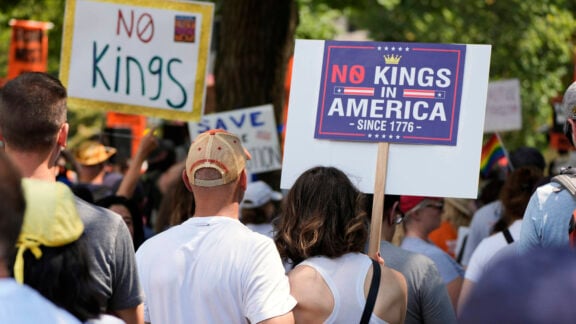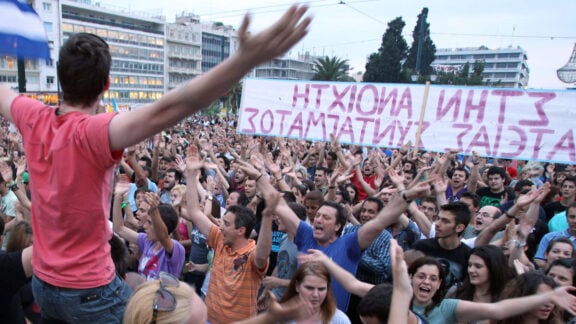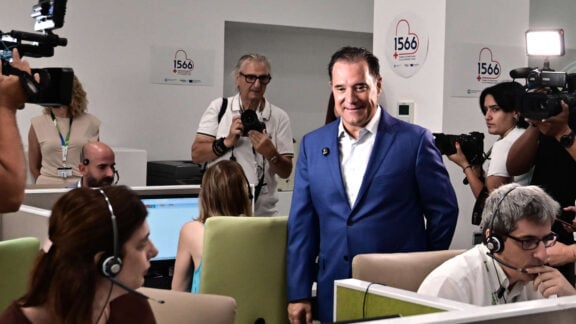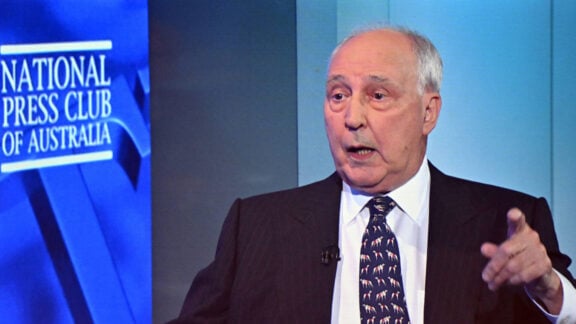Euro zone leaders struck a deal with private banks and insurers on Thursday for them to accept a 50 per cent loss on their Greek government bonds under a plan to lower Greece’s debt burden and try to contain the two-year-old euro zone crisis.
The deal means Greece’s debt burden will be sustainable, Greek Prime Minister George Papandreou said after the details were announced.
Greece will produce no more primary budget deficits from next year, but some of the country’s banks may face temporary nationalisation as a result of the debt relief, he warned.
“The debt is absolutely sustainable now,” Papandreou said.
“Let’s hope a new and better day dawns, both for Greece and for Europe … Greece can settle its accounts from the past now, once and for all.”
Under the 130-billion euro deal, Greece will obtain 30 billion euros upfront from other governments, as a guarantee for banks that will take part in the voluntary reduction of 100 billion euros of the debt they hold.
Papandreou said he expected the deal, which will be implemented through a bond exchange, to be wrapped up by the end of the year.
If Greece pushes reforms fast enough, it may even manage to return to markets much faster than 2021, as currently predicted by the International Monetary Fund (IMF), he added.
The haircut is expected to impose big losses on the country’s banks and state-run pension funds, which are up their necks in toxic Greek government bonds of about 100 billion euros.
The government will replenish pension fund’s capital, but banks may face temporary nationalisation, Papandreou said.
“It is very likely that a large part of the bank’s shares will pass into state ownership,” Papandreou said. He pledged, however, that these stakes will be sold back to private investors after restructuring.
“After restructuring we will then take it [the shares] out to the market, as other countries have done … it is a very standard procedure and nothing to be afraid of,” he said.
Eurozone leader’s agreement was reached after more than eight hours of hard-nosed negotiations involving bankers, heads of state, central bankers and the International Monetary Fund and aims to draw a line under spiralling debt problems that have threatened to unravel the European single currency project.
Under the deal, the private sector agreed to voluntarily accept a nominal 50 per cent cut in its bond investments to reduce Greece’s debt burden by 100 billion euros, cutting debts to 120 per cent of GDP by 2020, from 160 percent now.
At the same time, the euro zone will offer credit enhancements or sweeteners to the private sector totalling 30 billion euros. The aim is to complete negotiations on the package by the end of the year, so that Greece has a full, second financial aid program in place before 2012.
The value of that package, EU sources said, would be 130 billion euros — up from 109 billion euros — when a deal was last struck in July, an agreement that subsequently unravelled.
“The summit allowed us to adopt the components of a global response, of an ambitious response, of a credible response to the crisis that is sweeping across the euro zone,” French President Nicolas Sarkozy told reporters afterwards.
The French President said it had been an error to admit Greece to the eurozone in 2001 but said he was confident the country could emerge from its debt crisis. “It was an error because Greece entered with false [economic] figures … it was not ready,” he said during a nationally televised interview.
As well as the deal on deeper private sector participation in Greece -which emerged after Sarkozy and German Chancellor Angela Merkel personally engaged in the negotiations with bankers – euro zone leaders also agreed to scale up the European Financial Stability Facility, their 440 billion euro ($600 billion) bailout fund set up last year.
The fund has already been used to provide help to Ireland, Portugal and Greece, leaving around 290 billion euros available. Around 250 billion of that will be leveraged 4-5 times, producing a headline figure of around 1.0 trillion euros, which will be deployed in a variety of ways.
Leaders hope that will be enough to stave off any worsening of the debt problems in Italy and Spain, the region’s third and fourth largest economies respectively.
The EFSF will be leveraged in two ways, either by offering insurance, or first-loss guarantees, to purchasers of eurozone debt in the primary market, or via a special purpose investment vehicle that will be set up in the coming weeks and which is aimed at attracting investment from China and Brazil.
The methods could be combined, giving the EFSF greater flexibility, the eurozone leaders said.
“The leverage could be up to one trillion (euros) under certain assumptions about market conditions and investors responsiveness in view of economic policies,” said Herman Van Rompuy, the president of the European Council.
“There is nothing secret in all this, it is not easy to explain, but we are going to do more with our available money, it is not that spectacular. Banks have been doing this for centuries; it has been their core business, with certain limits.”
As with the July 21 agreement, which quickly broke down when it became difficult to secure sufficient private sector involvement and market conditions rapidly worsened, the concern is that Thursday’s deal will only work if the fine print can be promptly agreed with the private sector, represented by the Institute of International Finance.
Charles Dallara, the managing director of the IIF, said those he represented were committed to making the deal work.
“The specific terms and conditions of the voluntary PSI (private sector involvement) will be agreed by all relevant parties in the coming period and implemented with immediacy and force. The structure of the new Greek claims will need to be based on terms and conditions that ensure (net present value) loss for investors fully consistent with a voluntary agreement,” Dallara said.
Eurozone leaders will be hoping the agreement, which will also be accompanied by a recapitalisation of the European banking sector by around 106 billion euros, will finally draw a line under a crisis that has roiled financial markets and threatened to tear apart the euro single currency project.
As with previous deals that have come unstuck, the test will be how financial markets respond once they have digested the details and picked apart the seams of the agreement.
And EU finance ministers are not expected to agree on the nitty-gritty elements of how the scaled-up EFSF will work until some time in November, with the exact date not fixed.
As part of efforts to attract investors into the special purpose vehicle attached to the EFSF, Sarkozy said he would talk to Chinese President Hu Jintao in the coming days. Beijing has so far been a big buyer of bonds issued by the EFSF, which is triple-A rated by credit agencies.
Source: Reuters








